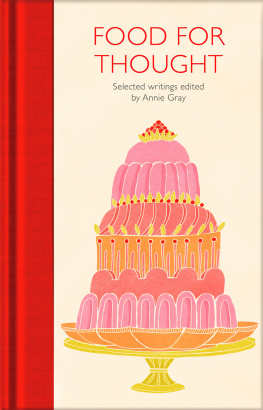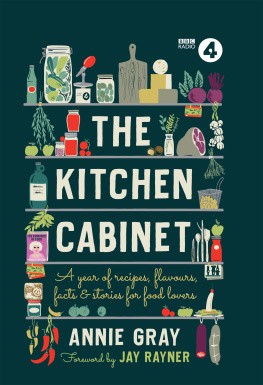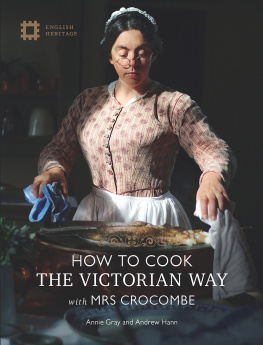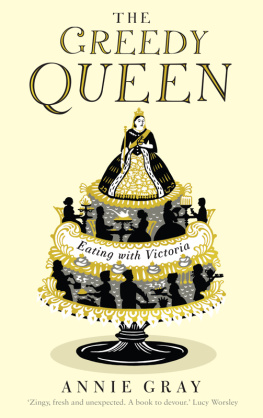Annie Gray (editor) - Food for Thought : Selected Writings
Here you can read online Annie Gray (editor) - Food for Thought : Selected Writings full text of the book (entire story) in english for free. Download pdf and epub, get meaning, cover and reviews about this ebook. year: 2020, genre: Home and family. Description of the work, (preface) as well as reviews are available. Best literature library LitArk.com created for fans of good reading and offers a wide selection of genres:
Romance novel
Science fiction
Adventure
Detective
Science
History
Home and family
Prose
Art
Politics
Computer
Non-fiction
Religion
Business
Children
Humor
Choose a favorite category and find really read worthwhile books. Enjoy immersion in the world of imagination, feel the emotions of the characters or learn something new for yourself, make an fascinating discovery.
- Book:Food for Thought : Selected Writings
- Author:
- Genre:
- Year:2020
- Rating:3 / 5
- Favourites:Add to favourites
- Your mark:
- 60
- 1
- 2
- 3
- 4
- 5
Food for Thought : Selected Writings: summary, description and annotation
We offer to read an annotation, description, summary or preface (depends on what the author of the book "Food for Thought : Selected Writings" wrote himself). If you haven't found the necessary information about the book — write in the comments, we will try to find it.
Food for Thought : Selected Writings — read online for free the complete book (whole text) full work
Below is the text of the book, divided by pages. System saving the place of the last page read, allows you to conveniently read the book "Food for Thought : Selected Writings" online for free, without having to search again every time where you left off. Put a bookmark, and you can go to the page where you finished reading at any time.
Font size:
Interval:
Bookmark:


- P ETRONIUS :
The Dinner of Trimalchio, from The Satyricon - A NON. :
Pancakes in the Manner of Tournai,
from Le Mnagier de Paris - A NON . :
The Forme of Cury - B EN J ONSON :
Inviting a Friend to Supper - S AMUEL P EPYS :
from The Diary of Samuel Pepys - A NON. :
The Womens Petition Against Coffee - D ANIEL D EFOE :
from Robinson Crusoe - J ONATHAN S WIFT :
Directions to the Cook, :
from Directions to Servants - W ILLIAM V ERRALL :
Preface, from A Complete System of Cookery - E LIZABETH R AFFALD :
Hen and Chickens in Jelly,
from The Experienced English Housekeeper - R OBERT B URNS :
Address to a Haggis - J AMES B OSWELL :
from Boswells Life of Samuel Johnson - W ILLIAM K ITCHINER :
from The Cooks Oracle - C HARLES L AMB :
from A Dissertation Upon Roast Pig - W ALTER S COTT :
from Saint Ronans Well - C HRISTIAN I SOBEL J OHNSTONE & W ALTER S COTT :
from The Cook and Housewifes Manual - J EAN A NTHELME B RILLAT- S AVARIN :
Aphorisms of the Professor, from The Physiology of Taste - J EAN A NTHELME B RILLAT- S AVARIN :
Gastronomical Industry of the migrs,
from The Physiology of Taste - W ILLIAM C OBBETT :
from Rural Rides - C HARLES G REVILLE :
from The Diary of Charles Greville - W ILLIAM T HACKERAY :
from Memorials of Gourmandising - C HARLES D ICKENS :
from A Christmas Carol - W ILLIAM Y ARRELL :
To Roast a Swan, from A History of British Birds - H ENRY M AYHEW :
Of the Street Sellers of Hot Eels and Pea-Soup,
from London Labour and the London Poor - E LIZA A CTON :
from The English Bread Book - A LEXIS S OYER :
from Culinary Campaign - O WEN M EREDITH :
Lucile - C HARLES S ELBY :
English Dinner for Snobs, from :
The Dinner Question - I SABELLA B EETON :
Victoria Sandwiches, from Book of Household Management - M ARY E LIZABETH B RADDON :
from Lady Audleys Secret - L EWIS C ARROLL :
from Alice in Wonderland - H ENRY L ABOUCHRE :
from Diary of the Besieged Resident in Paris - M ARY E LIZABETH B RADDON :
from Hostages to Fortune - A BBY F ISHER :
from What Mrs. Fisher Knows About Old Southern Cooking - A GNES M ARSHALL :
Iced Spinach la Crme, from The Book of Ices - F ANNY L EMIRA G ILLETTE & H UGO Z IEMANN :
Table Etiquette, from The White House Cookbook - M ARY K ROUT :
from A Looker-On in London - E LIZABETH R OBBINS P ENNELL :
The Simple Sole, from Feasts of Autolycus - A NON. :
She Cooked the Dinner - G ABRIEL T SCHUMI :
from Royal Chef - G EORGE S IMS :
Londons Light Refreshments,
from Living London - G.R.M . D EVEREUX :
The Orange, from Etiquette for Men - F RANK S CHLOESSER :
from The Cult of the Chafing Dish - A GNES J EKYLL :
Meatless Meals, from Kitchen Essays - C OUNTESS M ORPHY :
Fricasse of Iguana, from Recipes of All Nations - FRANCIS LADRY :
Lord Woolton Pie - G EORGE O RWELL :
In Defence of English Cooking - N EVIL S HUTE :
from The Far Country
Food is one of the fundamentals of life. At a basic level, we would die without it. Eating is one of the few certainties of human existence, and occasions to eat are threaded into our lives, both on an everyday and a highly ritualized basis. Food is so embedded in our cultures and our psyches that it defines us: how we eat, what we eat, and our beliefs about what and how we eat are among our most talked about, worried over, and deeply held values.
This collection of food writing loosely covers the development of British and British-influenced food from around the discovery of the ingredients of the New World at the end of the Middle Ages to the near-death of British cuisine after fourteen years of rationing during the Second World War. It ranges from the parties of the super-rich to the desperation of the achingly poor, and from the bright lights and easy access to food shops of the city, to the vegetable plots and fields of the remote countryside. Some writers gently muse, others hector from above. There are recipes, both practical and fantastical, and the fruits of long experience of both cooking and dining. There are chefs and cooks, eaters and diners. Fiction jostles with poetry which sits next to angry ranting and opposite a quiet onlooker.
Think of it as a dinner party: some guests you like, some you admire, and some you arent sure you want to see again, though it was fun at the time. The food, of course, is fabulous, the manners impeccable (to those who practise them, at least). Youll dip in and out of the conversation and, when it is all over, some of what youve experienced will stay with you. That, surely, is why its all food for thought.

One of the most famous fictional dinner parties, the feast given by Gaius Pompeius Trimalchio, is a satire on excess. Written by Petronius, a Roman writer and nobleman in the time of Nero, only a fragment of The Satyricon survives. It tells the story of Encolpius, his friend and his slave lover, as they ricochet from orgies to fights.
Trimalchio, the dinners host, is an ex-slave made good, a dissolute glutton married to an ex-dancer. His guests all talk too much (about sport, their own importance and the terrible decline in social manners), show off, insult their host as soon as his back is turned, and generally behave much like many bad dinner guests have for the last 2,000 years.
The conversation is dull, but the food is otherworldly. Prior to the boar stuffed with live thrushes served here, the diners have eaten honeyed dormice, pastry eggs stuffed with fig-peckers (a tiny warbler), and a zodiac-themed set of dishes including a pigs womb. Following it are at least another eight courses, ending with Trimalchios mock-funeral and our narrators rather queasy escape.
The Dinner of Trimalchio,
from The Satyricon
CHAPTER THE THIRTY-NINTH
Trimalchio broke in upon this entertaining gossip, for the course had been removed and the guests, happy with wine, had started a general conversation: lying back upon his couch, You ought to make this wine go down pleasantly, he said, the fish must have something to swim in. But I say, you didnt think Id be satisfied with any such dinner as you saw on the top of that tray? Is Ulysses no better known? Well, well, we shouldnt forget our culture, even at dinner. May the bones of my patron rest in peace, he wanted me to become a man among men. No one can show me anything new, and that little tray has proved it. This heaven where the gods live, turns into as many different signs, and sometimes into the Ram: therefore, whoever is born under that sign will own many flocks and much wool, a hard head, a shameless brow, and a sharp horn. A great many school-teachers and rambunctious butters-in are born under that sign. We applauded the wonderful penetration of our astrologer and he ran on, Then the whole heaven turns into a bull-calf and the kickers and herdsmen and those who see to it that their own bellies are full, come into the world. Teams of horses and oxen are born under the Twins, and well-hung wenchers and those who bedung both sides of the wall. I was born under the Crab and therefore stand on many legs and own much property on land and sea, for the crab is as much at home on one as he is in the other. For that reason, I put nothing on that sign for fear of weighing down my own destiny. Bulldozers and gluttons are born under the Lion, and women and fugitives and chain-gangs are born under the Virgin. Butchers and perfumers are born under the Balance, and all who think that it is their business to straighten things out. Poisoners and assassins are born under the Scorpion. Cross-eyed people who look at the vegetables and sneak away with the bacon are born under the Archer. Horny-handed sons of toil are born under Capricorn. Bartenders and pumpkin-heads are born under the Water-Carrier. Caterers and rhetoricians are born under the Fishes: and so the world turns round, just like a mill, and something bad always comes to the top, and men are either being born or else theyre dying. As to the sod and the honeycomb in the middle, for I never do anything without a reason, Mother Earth is in the centre, round as an egg, and all that is good is found in her, just like it is in a honeycomb.
Font size:
Interval:
Bookmark:
Similar books «Food for Thought : Selected Writings»
Look at similar books to Food for Thought : Selected Writings. We have selected literature similar in name and meaning in the hope of providing readers with more options to find new, interesting, not yet read works.
Discussion, reviews of the book Food for Thought : Selected Writings and just readers' own opinions. Leave your comments, write what you think about the work, its meaning or the main characters. Specify what exactly you liked and what you didn't like, and why you think so.









